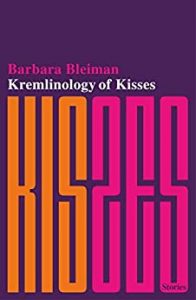On Writing and Teaching: Barbara Bleiman
 I was ten when I wrote my first novel. OK, so it was on lined paper, in a blue exercise book, written in pencil with lots of crossings out, and its subject was a fairy, but it was the start of thinking ambitiously about writing fiction. For many decades after that, life got in the way; I studied for an English degree and became an English teacher, still managing to steep myself in literature and the writing of others (including my school students) but without much scope for writing myself.
I was ten when I wrote my first novel. OK, so it was on lined paper, in a blue exercise book, written in pencil with lots of crossings out, and its subject was a fairy, but it was the start of thinking ambitiously about writing fiction. For many decades after that, life got in the way; I studied for an English degree and became an English teacher, still managing to steep myself in literature and the writing of others (including my school students) but without much scope for writing myself.
The classroom did provide me with small opportunities, tantalisingly thrilling moments when I could join the students in one of the writing tasks I’d set up for them, or when I did little experiments as examples to show them, as provocations for their own thinking.
Parodies featured heavily in this ‘writing alongside’, such as the rewriting of one set text author’s work in the style of another, along with the occasional humorous, satirical poem, written to capture a school trip, or to say goodbye to a group who were moving on to a new teacher. There were some duds but they usually went down pretty well.
The idea of teachers as writers, writing alongside their students, or just for themselves, has had a lot of traction in the USA, less so in the UK, though increasingly, people have been recognising the value of what can be taken back into the classroom. When I began working for a teachers’ development centre for English teaching, the English and Media Centre (EMC), and started running Continuing Professional Development on teaching literature, I found myself getting the participants to do small pieces of writing on as many courses as I possibly could. The benefits were immense, in my view, not just for the students but for the teachers themselves.
Of key importance for me is harnessing the power of writing to enrich and illuminate the texts you read, and vice versa. The author Francine Prose says,
‘If we want to write, it makes sense to read—and to read like a writer. If we wanted to grow roses, we would want to visit rose gardens and try to see them the way that a rose gardener would.’
It’s a two-way process. Gardeners toil the soil and appreciate others’ efforts. They borrow ideas from lovely gardens they’ve seen. Their own practical knowledge allows them to understand more about what’s there, and what’s been achieved by the greatest gardeners than someone who has never picked up a trowel. So too with reading and writing.
In my work with teachers, I continued having fun with my own little experiments, writing alongside the teachers as I did with my classes at school. Here’s one piece that I am still particularly fond of – one of those parodies I mentioned, in which I tell the opening of Pride and Prejudice in the style of Cormac McCarthy’s The Road.
A man had come to the neighbourhood. Alone. He wanted a wife, or at least that’s what the local people thought. The big house had been let and the woman found that interesting. She had heard all about it from her neighbour. She tried to interest her husband in the subject but he didn’t seem to want to know. She kept coming back to it: the house, the man and the man’s desire, his yearning for a wife. Again and again she told him. The husband grew tired of her words. She wanted him to visit the man but stubbornly he refused. He was weary and unwilling to go, out to the far side of the village, in the greyness, with the rain falling. The house and the man and the man’s desire for a wife – they were all as nothing to him. Finally, he thought that his one daughter might do, the second child. His wife had plans for the eldest. He felt more for the younger. The younger child’s quickness of wit matched his own. His wife’s temperament, by contrast, left him cold and her interest in the stranger was of no concern to him.
One other side of my work at EMC has been publishing resources for the classroom and, as part of that, I’ve worked with my colleagues to put together anthologies of poetry, non-fiction and short stories. Several years ago, we were working on a particular anthology, the product of a competition for school teachers to write a short story for eleven to fourteen-year olds. There were some fabulous entries and we made our selection. But when we came to prepare it for publication, we realised that, for classroom use, it was unbalanced.
There was lots of appeal for girls but not much for boys. At the last moment, I offered to write something. ‘A Case for Martinez’ was a detective story that, in my parodic style, played on Chandleresque language but in the context of a young boy living on a London council estate, looking for some excitement in his life. We published it. Subsequently, I did the something similar but in reverse, writing a story that might appeal to girls.
These experiences built my confidence and gave me an audience for my writing. I went on to do an MA in Creative Writing at Birkbeck and since then have published two novels. In October 2021, my collection of short stories, Kremlinology of Kisses, was published by Blue Door Press. Interestingly, many of the things that were core to my classroom experiences and work with teachers are at the heart of this collection. The stories are varied in style and tone, drawing on the conventions and styles of others; they are in conversation with some of the writers I have most loved and admired. They have elements of fun and experimentation, taking on different voices and entering other lives and worlds. I’m very much writing as a reader!
I started writing at primary school and I’m sure that writing would always have been part of my life, but my career as a teacher, working with school students and with teachers, has been the rocket fuel that put me into orbit. It has given me the impetus to write, the confidence to share that writing and the understanding that reading depends for its very life on writing, as well as the other way around.
—
Barbara Bleiman is an education consultant at the English and Media Centre (EMC). She has written numerous articles and blogs about English teaching, including a book of her writings, What Matters in English Teaching, published by EMC in April 2020 and described as ‘one of the most important books on English teaching ever written,’ (Marcello Giovanelli, Aston University).
As a fiction writer, she has published two novels, Off the Voortrekker Road (2015) and Accidents of Love (2017). A collection of short stories, Kremlinology of Kisses, was published by Blue Door Press in October 2020. It has been called a ‘dazzling collection of stories’ and ‘a brilliant celebration of the short story form’.
Kremlinology of Kisses
 In these twelve short stories, Barbara Bleiman explores the significance of a kiss in the lives of multiple characters. From Renaissance Italy to a prostitute’s bedroom in contemporary London, from the USSR under Brezhnev to a 1970s package holiday in Spain, from a hospital ward today to a ‘bubble’ far in the future, the stories adopt different voices and genres, creating a kaleidoscope of contrasting angles and styles. Inspired by Chekhov’s iconic short story, ‘The Kiss’, this richly varied collection – wistful, sensual, painful and at times quirky and comical – appeals both to the head and the heart.
In these twelve short stories, Barbara Bleiman explores the significance of a kiss in the lives of multiple characters. From Renaissance Italy to a prostitute’s bedroom in contemporary London, from the USSR under Brezhnev to a 1970s package holiday in Spain, from a hospital ward today to a ‘bubble’ far in the future, the stories adopt different voices and genres, creating a kaleidoscope of contrasting angles and styles. Inspired by Chekhov’s iconic short story, ‘The Kiss’, this richly varied collection – wistful, sensual, painful and at times quirky and comical – appeals both to the head and the heart.
Kremlinology of Kisses and Barbara’s two novels are available on Amazon:
https://www.amazon.co.uk/Kremlinology-Kisses-Stories-Barbara-Bleiman-ebook/dp/B08MBCVBNH
Category: Contemporary Women Writers, How To and Tips






























